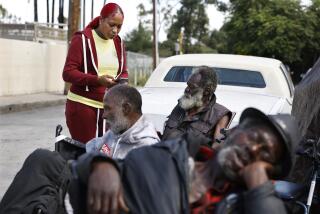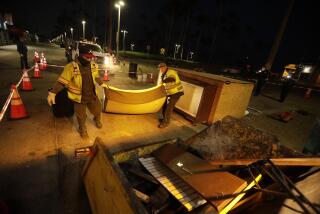Waiting for Work
MOORPARK — Every day, as early as 4 a.m., Mario Hernandez is on the corner of Spring Road and High Street, in front of the Tipsy Fox convenience store looking for work.
The 27-year-old Hernandez, with a wife and 1-year-old to provide for, says this busy corner is his only real option for a decent wage.
It’s a similar story in Thousand Oaks. At Fairview Road and Crescent Way, dozens of mostly Latino men wait on a dirt shoulder for a chance at jobs that range from raking leaves for an hour or two to a full day of construction work.
In both cases, nearby residents and merchants have consistently complained about the workers--calling the gatherings an eyesore or safety hazard--and have attempted to relocate them.
City-run job centers and hiring halls in other parts of Southern California--such as Costa Mesa, Orange and North Hollywood--have sprung up to address the issue in those communities, but have met with mixed success.
“The goal was to get people off the streets and out of the parks and give them a place where we can put employer and worker together,” said Glenn Stroud, who supervises the Costa Mesa job center. “We’ve been successful, but there’s still a lot of people on the street soliciting jobs.”
While such facilities help workers land day jobs quickly, officials have found that only a fraction of the day laborer pool uses the centers. Most centers require workers to prove they are in the country legally to register for work, and many of those seeking the jobs are illegal immigrants.
A groundbreaking study by the Los Angeles Human Relations Commission of day laborer hiring sites in Southern California and eight other states shows that black and white workers make up 14% of the men who use the Costa Mesa center. The report, due for release later this week, found that 97% of the day laborers in Orange and Los Angeles counties are Latino immigrant men. No statistics were included on Ventura County.
Although workers are often stereotyped as menial laborers, the study found that a surprising number are skilled electricians, mechanics, masons, roofers and bakers. Officials at the Orange center said one immigrant was skilled in computer graphics.
The centers are an attempt by cities to stop the practice of workers gathering at storefronts and street corners throughout the day waiting for an employer to hire them.
In Thousand Oaks, Councilman Andy Fox vowed to tackle the day laborer issue in September after frustrated neighbors crowded into City Hall to voice their concerns. Five months later, Fox said that despite close study he still does not have a specific location to suggest for a job center.
“We’re on track, but it’s taking time,” he said.
Moorpark Still Looking for Solution
Creating a hiring center has been a goal in Moorpark for years, but little progress has been made as proposals fell through and experiments failed, city officials said.
Ventura County Sheriff’s Capt. Bob LeMay, who acts as Moorpark’s police chief, said he will make creating a center a priority. The department gets steady complaints about the workers at the Tipsy Fox, but he said there is little an officer on the street can do.
“I am looking for some type of creative solution that will be beneficial to both the residents and these individuals [who] are only trying to scratch out a meager living,” he said.
Meager is an understatement, Hernandez said. Some days, he gets lucky and a construction contractor will pick him up for a $70-per-day job that lasts weeks. Other days, he just sits as disapproving store patrons file in and out of the Tipsy Fox, sometimes letting the clusters of workers--sitting on stumps and leaning against walls--know how they feel about their presence.
“A couple of weeks ago, someone came here and told us, ‘Go back to Mexico and stay there--nobody wants you here,”’ said Hernandez, who has lived in Moorpark for seven years and speaks limited English.
He said he wishes there was an official place where he and his fellow laborers could wait and not be harassed, and where potential employers would feel more comfortable picking up an extra worker.
Most municipalities have enacted ordinances prohibiting the solicitation of work in public areas. Orange police enforce the city ordinance aggressively, arresting many workers who are later turned over to the Border Patrol and deported.
However, the Human Relations Commission’s study found the ordinances to be ineffective. Researchers found that “as long as there are jobs available, the workers will continue to gather.”
According to the study, ordinances are sometimes also applied unfairly.
“Police . . . often abuse the law by harassing Latino men into moving away from places where they have legal rights to stand. . . . Law enforcement also misuses the ordinance to break up employment relationships which may be legal. Moreover, abuse of the ordinance is often discriminatory toward minorities,” the report said.
Jose Campa, who works part time at the Orange Job Center, recently had to chase off three scruffy men who were not registered with the center.
“All they want to do is work,” said Campa, a burly retiree from El Paso. “But the rules say that only registered workers can be here.”
The three men said they had arrived from Veracruz, Mexico, 15 days earlier and had lost all their money--$200 apiece--to the smuggler who brought them. They were penniless, had not worked since they arrived and were living on the street. But at a North Hollywood hiring hall run by the Coalition for Humane Immigrant Rights of Los Angeles, even illegal immigrants can register. The facility is unlike any other in Southern California.
One Hall Fosters Sense of Belonging
Most mornings, the workers are provided coffee and Mexican sweet bread. When the coalition began running the hall in 1997, it quickly fostered a sense of belonging among the workers.
Workers tend a vegetable garden and have formed a band, soccer team, theater troupe and marathon team. They also perform community service, such as graffiti removal, and can check out books from the hall’s library.
Robin S. Toma, executive director of the Los Angeles County Human Relations Commission, said it is foolhardy to restrict hiring halls to legal residents.
“It’s a liability if the goal is to establish a site for a more organized method of job distribution,” Toma said. “Inclusive hiring benefits everyone: the community, workers, employers and, most of all, the police, who have better things to do than enforce ordinances and chase people away from street corners and stores.”
But in Ventura County, which has no city-sponsored job centers, the street corner is often the best place for a day laborer to land a job.
“For the guys without papers, this is their only option,” said 31-year-old Leonel Reyes, a Moorpark father of two who has solicited work in front of the Tipsy Fox for a decade.
Reyes works regularly for a local construction company, a job he landed while waiting for work in front of the liquor store. But on rainy days when the work stops, he’s back on the corner, trying to make up the difference in his weekly paycheck.
“I have my family to think about,” he said.
Antonio Morales, 54, an immigrant from El Salvador who said he lost most of his family in the earthquakes that have devastated the country this year, hadn’t worked at all last week as of Thursday. That’s a common occurrence during the rainy season, workers said, when there is a marked drop in outdoor jobs.
As Morales killed time picking up trash and pulling weeds from the landscaped medians that abut the store’s parking lot, he said he usually can get $50 for a full day’s work.
“This week, I haven’t made enough to even eat,” he said.
On a recent morning at the hiring center in Orange, only about a dozen of the 43 workers who had registered for the day had been hired by the time the center closed at 10 a.m.
Many Workers Are Not Paid
The centers aid the workers in other ways: Since city officials keep track of the workers and the contractors who hire them, the workers usually earn more than the $6.25 California minimum wage, and the contractors are less likely to cheat them of their pay. Occasionally, wages are paid in cash with no taxes withheld and no record--other than at the center--that employer and employee met.
“I’ve heard terrible stories from these guys about contractors who work them for three or four days and never pay them. This usually happens with workers who hang out on the street. We’ve had one or two contractors who have done that, but we know who they are and call them,” Campa said.
The commission’s report quoted from a separate study of Los Angeles-area day laborers that found 48% had worked for an employer who never paid them and 52% had been paid less than promised at one time or another.
Occasionally, workers will land a longer-term job. Manuel Soto recently was laid off after three years from a construction job he got through the Orange center.
“I took advantage of the opportunity. I learned all about construction and after a few months I was made a heavy equipment operator,” said Soto, speaking a mixture of English and Spanish. “I was making good money until the contracts ran out and lost my job.”
On this morning, Soto, 30, said he was willing to take any job offered him for the day.
The Orange center uses a lottery system to place workers. The names of Spanish-only speakers are written on slips of white paper and placed in a glass bowl. The names of workers who speak English are written on green slips and placed in a woven basket. People are hired on the luck of the draw.
Luis Mandujan, 29, said workers rely on each other to keep order at the facility.
“We don’t allow anybody to get loud or rowdy. Everything is kept very dignified here. The guys jump on anybody who brings beer. Employers don’t want to see people arguing or drinking when they come in looking for workers.”
*
Times staff writer Ofelia Casillas contributed to this story.
More to Read
Sign up for Essential California
The most important California stories and recommendations in your inbox every morning.
You may occasionally receive promotional content from the Los Angeles Times.










